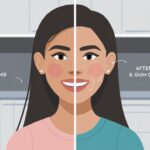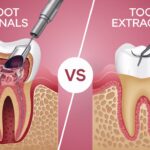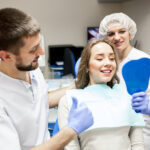Diagnosing and Overcoming Obstructive Sleep Apnea
Obstructive sleep apnea can be difficult to diagnose. Patients may experience symptoms that are common to other issues. It takes special sleep testing to confirm sleep apnea mouth guard. It is important to visit your dentist, as well as your regular physician if you are trying to get answers. Sleep apnea leaves some noticeable markers on your teeth that may need attention. Along with a special sleep mask, you may need additional equipment from your dentist to help you breathe at night. There are a few key things your dentist can do to help you through your sleep apnea treatment.
Where to Begin if you Suspect Obstructive Sleep Apnea
Obstructive sleep apnea is serious and can affect many aspects of your life. Many people just think they do not sleep well. They may take sleep aids or change dietary habits. When the exhaustion continues, they finally see the doctor. If you are experiencing exhaustion, do not hesitate to call the doctor. Visit your primary care physician to get a referral to a sleep clinic.
Since you are asleep when many of the symptoms are present, professionals need to observe you as you sleep. You should also visit your dentist as soon as possible. You may need special dental devices to wear during the night. Sleep apnea can also affect the health of your teeth and jaw. Restorative work may also be necessary.
What is obstructive sleep apnea?
Sleep apnea causes your breathing to stop and start at different times while you are sleeping. When you have obstructive sleep apnea, the muscles in your throat relax and block the passage of air.
Signs and Symptoms of Obstructive Sleep Apnea
Sleep apnea symptoms can be confused with other problems. Many things cause exhaustion. If you feel tired all the time, even after sleeping for several hours each night, ask your doctor about sleep apnea. If someone in the home repeatedly tells you that you snore, you may also have sleep apnea. Obstructive sleep apnea (OSA) can be treated successfully once you get a proper diagnosis.
What are the warning signs of obstructive sleep apnea?
There are some serious warning signs of obstructive sleep apnea. Talk to your doctor immediately if you notice them.
- Waking up suddenly choking or gasping for air
- Night sweats
- Mood problems- irritable, depressed, anxious
- Snoring
- Constantly feeling tired or trouble concentrating
- Headache, sore throat, or dry mouth when you wake up
- A rise in blood pressure
What are sleep apnea symptoms?
Central sleep apnea is different from obstructive sleep apnea, yet the symptoms are similar. Your brain does not communicate properly with the muscles used for breathing with central sleep apnea. You should still look out for the same symptoms, however.
Why do People get Sleep Apnea?
Different health issues can contribute to sleep apnea. Adults with excess weight have a higher risk of developing obstructive sleep apnea. This affects the soft tissue in the throat and mouth. Children can have apnea due to large adenoids or tonsils. An excessive overbite can also cause apnea in children. URBN Dental can help you diagnose dental irregularities. Proper dental care can help prevent and treat apnea. Face structure can also be a contributor. Birth defects can cause some of these irregularities.
What Causes Apnea in Adults?
Obesity is the main cause of sleep apnea in adults. Your muscles need to relax when you sleep, however, the muscles that help keep your airways open should remain active. Problematic tonsils can be a problem for adults, as well as children. If you have had problems in the past and still have your tonsils, talk to your doctor about the possibilities. The simple act of sleeping on your back can also bring on apnea symptoms. You should also be aware of a few other things.
- Issues with sinusitis
- A recessed chin (bottom jaw further back than normal)
- Genetics (ask family members if they have apnea)
- Smoking habit
- Onset of menopause
Explanation of Snoring Disorder Sleep Apnea
Sleep apnea snoring is one of the first symptoms that people notice. Snoring is not always a sign of sleep apnea, however. Always check with your doctor if snoring is excessive or loud. If there are other signs and symptoms of sleep apnea, your doctor may test you. Snoring with sleep apnea results from relaxed tissues in the airway blocking airflow. The vibration causes the snoring sound.
Different Ways to Treat Sleep Apnea
Treatment for sleep apnea depends on what is causing it. You need to be properly tested. You should visit your primary physician, a sleep clinic, and dentist. Adults can consider losing weight, quitting smoking, and drinking less alcohol. Even changing your sleep position can help. These life changes are not meant to be a cure but can enhance your treatment. You may need to sleep with a machine that keeps your airways open (CPAP), surgery, or dental devices.
How to cure sleep apnea?
A complete cure may not be possible. Most doctors treat the symptoms. If you have problems with tonsils or adenoids, the problem may dissipate after surgery. If you are obese, weight loss can help decrease the severity of your sleep apnea, as well.
How is Sleep Apnea Treated in Adults: Your Dentist’s Role
Your dentist can make a custom mouth (MAD) to help move your jaw forward. A device to keep your tongue in place keeps it from obstructing the airway, as well. The professionals at URBN Dental can help you with these items. Your dentist can also repair damaged teeth from the grinding that plagues some sleep apnea patients. An orthodontist can remedy a severe overbite. The dentist is usually a part of several treatments for sleep apnea. A dental spa in River Oaks can plan a consultation for you.
What to Expect at Sleep Apnea Treatment Centers
When you show signs and symptoms of sleep apnea, a clinic can do special tests. Expect to stay overnight at least once for an evaluation. They need to see what is going on with your body when you fall asleep. After testing, there is a consultation about your treatment plan.
Finding Sleep Apnea Treatment Near Me
If your dentist sees signs of sleep apnea during a routine exam, he may tell you to visit your physician. Your regular doctor may then refer you to a sleep clinic after a thorough exam. You can also contact a sleep clinic on your own to start the evaluation. You are sure to find one in your area with a quick online search.
FAQ’s
What is obstructive sleep apnea/hypopnea?
Obstruction of the airway causes OSA. Obstructive sleep apnea is often caused by overly relaxed soft tissue, enlarged tonsils, or large adenoids.
What is sleep apnea?
The definition of sleep apnea is the intermittent stopping and starting of breathing throughout the time you are sleeping.
How to treat obstructive sleep apnea?
Treatment depends on the cause and proper diagnosis. You may need to lose weight, have surgery, or wear a CPAP machine. A dentist can also make a mouth guard or tongue device. Cosmetic dental changes can also improve the issue.
How does my health change after sleep apnea treatment?
Sleep apnea puts you at risk of falling asleep while driving or operating machinery. You can be much safer in many situations once you can sleep well. Your risk of cardiovascular disease also declines. Mood problems can also improve with better rest.
What can my dentist do to help me with sleep apnea?
Your dentist can make a mouth guard to help with your jaw and teeth grinding. They can also prepare a tongue device to keep your airway clear.
Obstructive sleep apnea can be dangerous. It is important to get help immediately, once you suspect you have it. Your doctor can help confirm the diagnosis. It may take several doctors to come up with a highly recommended plan. Your dentist is one of these. Call URBN Dental for an appointment today.
Summary:
Obstructive sleep apnea can be dangerous and cause many health issues. It is common to think you are tired from other things, such as a busy work schedule or family life. Sleep apnea, however, can cause you to wake up repeatedly throughout the night due to difficulty breathing. You may not realize what is happening since you are asleep. Many patients wake up suddenly gasping or coughing. Loud snoring is one of the most common symptoms. Snoring can be a symptom of many issues, so a proper sleep evaluation is necessary. You need to visit your primary care doctor for a thorough exam and a referral to a sleep clinic. At the sleep clinic, you have tests while you are sleeping. You should also visit your emergency dentist near me. You may have damage to your teeth or need corrective orthodontics. Some sleep apnea patients also need a mouth guard or a device to control their tongue. It may take several doctors to come up with a highly recommended plan for you.















